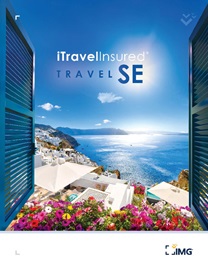Insurance
Choose the plan that meets your needs and spend more time enjoying your international experience not worrying about your insurance coverage.
Find Your PlanWhat type of coverage
do you need?
Travel Medical
Insurance
Temporary coverage for accidents, sicknesses, & emergency evacuations when visiting or traveling outside of your home country.
International Health Insurance
Annually renewable international private medical insurance coverage for expats and global citizens living or working internationally.
Travel
Insurance
Coverage designed to protect you from financial losses should your trip be delayed, interrupted, or cancelled.
Enterprise Services
Meet your duty of care obligations with confidence, knowing your travelers are safe, healthy, and connected wherever they may be in the world.
Show ServicesWhat type of organization do you represent?
Medical & Travel
Assistance
Your travelers can access 24/7 global support should they need medical attention, travel assistance, or medical transport services.
Global Workers' Compensation Case Management
Rest assured knowing you have an experienced team who is committed to reducing your costs, moving your files forward, and serving as an international resource for all your work injury claims.
Security Assistance
Services
Keep your travelers safe, no matter where they are, with real-time alerts and intelligence on safety, health, political, and other global risks.
Insurance Administrative
Services
You’ll have experts to guide you through all things related to your health care plan needs, from enrollment to claim reimbursement.

Travel Medical Insurance
See Prices & Compare Our Travel Medical Plans
Travel Medical Insurance protects you in the event of an illness or injury when traveling outside of your country of residence. It provides key medical benefits in case of an emergency.
Traveling abroad is an exciting experience, but unpredictable illnesses and accidents can happen. Even worse, the resulting medical bills can be overwhelming. The level of international medical coverage provided by your domestic insurance provider can vary greatly depending on your plan, so you may have very limited coverage or no coverage at all. A travel medical insurance plan can provide the coverage you need. For more information, check out our blog: "How to Choose the Best Travel Medical Insurance Plan."
Travel medical coverage is ideal for:
- International vacationers
- Relatives visiting from overseas
- People going on cruises, safaris or guided tours
- International business travelers
- Students studying abroad
International Medical Group® (IMG®) also offers travel insurance that protects your health as well as your trip costs and travel expenses. And if you need long-term medical coverage, check out our international health insurance. IMG plans include a wide range of medical benefits, protection, and support should a problem arise.
Popular Travel Medical Plans
Ideal for Traveling Outside of Your Home Country
Additional Travel Medical Insurance Plans

Patriot Lite Travel Medical Insurance
Temporary health insurance for individuals, families, and groups when traveling outside of your home country.
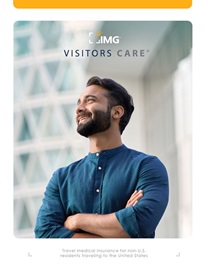
Visitors Care
Temporary fixed coverage health insurance for non-U.S. residents when traveling outside of your home country.

Student & Scholar Insurance
Student health insurance plans tailored to fit the needs of international students involved in educational or cultural exchange.
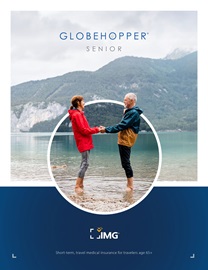
GlobeHopper Senior
Temporary health insurance for travelers age 65+ when traveling outside of your home country.
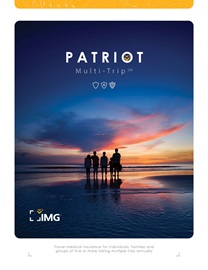
Patriot Multi-Trip Travel Medical Insurance
Annual multi-trip travel medical insurance for individuals, families and groups.
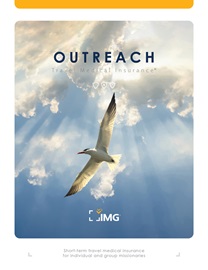
Outreach Travel Medical Insurance
Temporary health insurance for missionaries and mission groups when traveling outside of your home country.

Why Do I Need Travel Medical Insurance?
Depending on where you travel, you may encounter language and currency barriers that prevent you from accessing high-quality medical care. Check out IMG’s Why You Need Travel Medical Insurance Now More Than Ever to learn more about some of these challenges.
Traveling unprotected can leave you vulnerable to paying high out-of-pocket medical expenses, and navigating a foreign health care system without the assistance you need.
However, with a travel medical insurance plan, you can worry less and experience more knowing you have medical coverage and a trusted health advisor who can support you in your time of need.
Get even more information by checking out our article, “Do I Need Travel Medical Insurance?”

How Much Does Travel Medical Insurance Cost?
Less than $3 per day for an average plan.
Like other travelers, you may be wondering if the coverage is worth the cost. It may surprise you to learn that IMG’s travel medical plans can cost less than $3 per day (based on an average plan) and can provide coverage worth well beyond your initial cost. Pick a plan and get protected.
Factors that Determine Cost
The cost of a plan varies based on many factors including:

Age of Traveler
Age is one of the primary factors that determines insurance rates. Each IMG plan has a complete breakdown of insurance rates based on ages that can be found in the plan brochure.

Destination
Medical expenses vary around the world. To provide the best balance of coverage and cost, plan coverage rates may be different for a traveler visiting the United States than they are for a traveler in a destination where healthcare is less expensive.

Duration of Trip
A breakdown of daily rates and monthly rates can be found in IMG plan brochures. If you need long-term coverage (1 year or more), view our international health insurance plans.

Deductible, Maximum Limit, & Additional Optional Coverage
Customize your plan by choosing the deductible amount, maximum limit, and any optional rider that is best for you.

When Is Travel Health Insurance required?
Some countries may require you to purchase travel health insurance to gain entry.
Traveling to Schengen Countries
Schengen countries require visa applicants to prove they have travel medical insurance to cover expenses for repatriation, urgent medical attention, emergency hospital treatment and more. Read our blog about Countries that Require Travel Medical Insurance for Entry to learn more.
Other Situations
You may also be required to purchase travel health insurance depending on the purpose of your trip. The U.S., for example, requires those traveling on a J1 or J2 visa to maintain a certain level of medical coverage for the duration of their stay. However, if you're visiting the U.S. on a B2 visa, a travel medical insurance plan is only recommended. Find out How to Choose the Best Visitor Insurance Plan for You.
Travelers embarking on other trips — such as organized tours, working holiday schemes, mission trips, and cruises — may also be required to purchase coverage.
These are just a few reasons when you would be required to purchase Travel Medical Insurance. See the full list for 6 Times You Need to Purchase Travel Medical Insurance.
Recent Blog Articles
Wanderlust Lifestyle: How This Couple Left Their Jobs to Travel the World
You may feel it when scrolling through your Instagram and Facebook feeds. When you take a break to daydream on a particularly busy day at work, or go for a walk and wonder what lies beyond your 9-to-5 desk job. When you go on vacation and long for an extension of the perfect, responsibility-free unreality.
It’s wanderlust. And once it’s taken hold of you, it’s nearly impossible to escape it.
For most people, this fantasy of the perfect life — filled with exotic destinations, cultural experiences and reckless spontaneity — is just a dream. It’s a break from the reality of life’s everyday challenges. For others, however, it’s a lifestyle. But don’t be fooled. The wanderlust lifestyle is filled with its own set of challenges.
Take it from Mirella and Romulo, a Brazilian couple in their 30s who have perfected the art of traveling full time. In January 2015, the two left their jobs, sold their belongings and said their goodbyes to travel the world. With backgrounds in business and marketing, they started a project called Travel and Share, and began partnering with brands to use their products and services in exchange for exposure on social media.
When they launched Travel and Share, Mirella and Romulo planned to travel five continents in three years, recording all of their adventures and real-life, unedited experiences through video blogs, pictures and posts. Now, nearly two years into their travels, Mirella and Romulo have visited 23 countries on two continents.
"In our previous jobs we had to travel a lot, but in business travel you only get to see the same things everywhere: hotels and offices," Mirella tells International Medical Group® (IMG®). "We wanted to see the differences in each country, and to get to see that, we would have to stop traveling for business and start traveling for real."
And so began their journey. But it hasn’t been without its fair share of challenges. IMG asked the couple to share their advice and "lessons learned" for other international travelers who are captivated by the wanderlust lifestyle. Here are the tips they shared:
1. Don’t Over-Plan
Of course, there’s a caveat: Some things you have to plan (i.e., tip No. 2). However, planning absolutely every detail of your travels may close the door to other opportunities.
"We don’t over-plan," Mirella says. "We know more or less where we want to be in the short- and medium-term."
When you’re open and willing to adapt your schedule, you may get more out of your travels.
"It’s nice to have an agenda and itinerary, but it’s also important to be flexible. It has already happened to us many times that we liked one place a lot and wanted to stay longer, while other places we didn’t like as much, so we just passed through," Mirella says.
2. Finance Properly
When you decide to travel the world, you often decide to lose a steady income. That’s why it’s important to save money far in advance.
You must consider several costs, including lodging, food, transportation, miscellaneous expenses and the unpredictable accidents that could happen along the way.
"It is very stressful to travel thinking that you can run out of money at any time," Mirella says. "It is best to have your savings and budget planned for the time you have decided to travel."
Mirella and Romulo saved up for five years, planning to spend $1,000 USD per month. They estimated that 60% of their budget would go toward gas for their vehicle, and the remaining balance would be spent on food and other items.
Lodging is a nominal expense for the two, as they rely on Couchsurfing, a Web-based platform that connects travelers to hosts across the globe who open their homes for free. Additionally, Mirella and Romulo keep a tent in their truck in the event they can’t find a host through Couchsurfing.
To get started with your savings, Mirella recommends putting aside 20% of each paycheck for your travels.
3. Protect Your Health & Well-Being
Constant travel can be harsh on your health. In fact, a 2015 study revealed the darker sides of frequent travel, noting the physiological, social, psychological and emotional consequences of "hypermobility," specifically related to frequent business travel.
While the wanderlust lifestyle can be characterized as leisure travel, it does resemble business travel in that frequent mobility is a necessary function of the person’s day-to-day life.
As such, it’s important to keep in mind that traveling full time isn’t always as glamorous as it seems. The research points to a number of factors that can impact your overall health, including:
- Jet lag
- Fewer opportunities to exercise
- Worse eating habits
- Over-consumption of alcohol
- "Frequent traveler exhaustion"
- Disorientation
- Stress
- Loneliness and isolation
- Identity confusion
Although many of these health consequences are hard (if not impossible) to control, there are others that are more easily managed. With regard to exercise, Mirella recommends walking as much as possible instead of driving or taking public transportation.
To ensure you eat healthier, she recommends cooking your own food instead of dining out. Also, keep in mind food and beverage safety when traveling internationally.
The Centers for Disease Control and Prevention (CDC) advises international travelers to steer clear of raw food, street food and "bushmeat" — local wild game not eaten in every country. Hot food, and dry or packaged foods are usually safe. For drinks: When in doubt, bottled or canned drinks are typically safe, but be wary of dishonest vendors who may sell tap water in bottles and use glue to mimic a factory seal, the CDC warns.
On the subject of beverages, avoid drinking too much alcohol during your travels for obvious health reasons. Mirella also adds, "Being hungover is not a nice thing to be while you’re in another country."
She also has some tips to help combat the emotional and psychological challenges you may experience:
- Have a purpose on your trip. "After a while, travel can get boring, so if you have a purpose like writing for a blog, learning another language or making a documentary, it can fill a gap when you are tired of just traveling."
- Make it a point to meet new people. "In every country we visit, it is really comforting to make friends there. [Plus], we get tips about the country to live like more than just a tourist."
- Stay connected with your friends and family back home. "We left our hometowns a long time ago, so we were used to being away from home already, but nowadays it is so easy to use FaceTime and video calls to stay connected; that helps a lot."
Keeping all of this in mind when planning your trip can help protect your health and well-being during your travels.
4. Get Covered
You may think you’ll never need insurance, but even travel pros experience medical emergencies. That’s why Mirella and Romulo rely on travel medical insurance.
"It’s really hard to travel thinking that if something were to happen to our health, we could get in a lot of debt or it could ruin our trip," Mirella says. "Travel [medical] insurance gives us peace of mind."
This type of coverage is specially designed to protect you in the event of an unexpected illness or injury when you’re traveling outside of your country of residence. For Mirella and Romulo, travel medical insurance has come in handy a few times. Here’s one example:
"We were in a hotel in Costa Rica, having tons of fun – until we went out for dinner. Romulo ordered a tuna filet with mashed potatoes, which ended up being spoiled. The result was 12 hours in the bathroom," Mirella says.
After going to a hospital and receiving medication for food poisoning, Romulo still wasn’t feeling well. They called their hotel nurse, but she couldn’t help.
"With my temperature getting higher, we couldn’t wait any longer so we went to another hospital," Romulo says. "When we arrived, the doctor injected medicine into my veins. We had to pay over $1,000, which was way too much for us. We would have never been prepared to spend that much money on medicine, but we could handle this situation because we had travel medical insurance."
Mirella adds, "Travel medical insurance is crucial."
Despite the many challenges that come along with the wanderlust lifestyle, one thing is true for Mirella and Romulo: Preparation has been key — whether it’s purchasing travel medical insurance, understanding health risks abroad, budgeting properly or planning a flexible schedule.
The lessons they’ve learned and the tips they’ve shared with IMG can serve as a starting point for others who are interested in traveling the world.
However, you may still be curious about one more detail of their travels: With so many unique and beautiful places to visit, how do they choose where to go next? For Mirella, it comes down to the people who live there.
"A city is just a place to see, but people and new cultures teach you things," she says.
Disclaimer
This is not an offer to enter into an insurance contract. This is only a summary and shall not bind the company or require the company to offer or write any insurance at any particular rate or to any particular group or individual. The information on this page does and will not affect, modify or supersede in any way the policy, certificate of insurance and governing policy documents (together the "Insurance Contract"). The actual rates and benefits are governed by the Insurance Contract and nothing else. Benefits are subject to exclusions and limitations.

